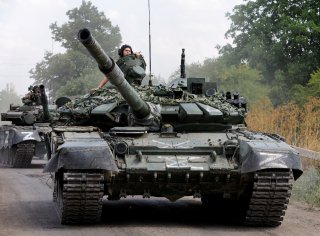Sanctions Won’t End Russia’s War in Ukraine
Although Western sanctions against Russia have imposed high costs on all parties, economic warfare alone won’t end the war in Ukraine.
The Way Forward
Sanctions are the wrong tool to solve the strategic problem facing the West. The West wants Russia to end its invasion of Ukraine, which Russia sees as closely tied to its national security. To change the foreign policy of a state on something of such great stakes, the leverage employed has to be equally sizable. Currently, the process of designing multilateral sanctions—with participating states seeking to decrease individual costs, a long negotiation process, and compromises required—gives Russia time to adjust to future economic pressure and provides Western firms with counterproductive incentives to trade more with Russia before sanctions start. The resulting leverage of the sanctions is insufficient to meaningfully affect Russia’s decisions.
Changing the nature of the negotiations over sanctions is not possible. Every state of the multilateral coalition has to agree on the final sanctions package. Garnering such an agreement requires time and exceptions for states that would not agree to the sanctions package otherwise.
The other way to increase the sanctions’ leverage is to ensure that Russia can’t adjust to the effects of the sanctions package before it is enforced. This requires getting India and China, as well as other smaller yet key economies, on board with the sanctions regime. To tempt India, at the very least, the West would need to offer oil at a cheaper rate than Russia. Of course, this would be no guarantee of Indian participation; the expected outcome would merely level the playing field with Russia. It is hard to imagine what could get China to agree on a sanctions package against Russia. It is even harder to imagine the West being willing to pay that price. Yet, as long as Russia has viable alternative markets for its key exports and alternative trade partners willing to sell it necessary products, sanctions will not be able to apply sufficient pressure to change Russia’s policy in Ukraine.
To facilitate an end to the war in Ukraine, the West will need to look to alternative tools. At this juncture, diplomacy is the tool most likely to succeed. As Russia has nuclear weapons, even a decisive military victory by Ukraine that pushed Russian troops beyond the border is not a guarantee of war termination. Russia can continue shelling Ukrainian infrastructure from its territory. Moreover, a Ukrainian incursion into Russian territory would carry significant risks of nuclear retaliation.
Ultimately, Russia will decide when the war will end, making diplomacy necessary. A consideration of Russia’s security interests in Europe, rooted in an end to NATO expansion, will likely be needed to negotiate a settlement.
Mariya Grinberg is an Assistant Professor of Political Science and a member of the Security Studies Program at MIT.
Image: Reuters.

